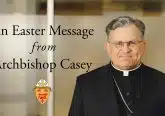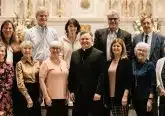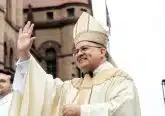St. Xavier Parish hosts talk on end-of-life issues
April 1, 2011
By Eileen Connelly, OSU
CATHEDRAL DEANERY — No one likes discussing end-of-life issues, but the reality is that conversing about such matters in advance of losing a loving one can ease the grieving process.
Recognizing the importance of addressing the issues, St. Francis Xavier Parish in downtown Cincinnati hosted “Let’s Talk” March 26. About 50 people attended the seminar, which was organized by Barbara Westendorf, pastoral associate for Christian outreach. The program featured presentations by Michael T. Coler, executive director of The Kenwood by Senior Star retirement community; Ken Czillinger, a grief counselor and former bereavement manager for VITAS Hospice; attorney Ralph Ginocchio; and Stephen Rohde, a funeral director and owner of Geo. H. Rohde & Son Funeral Home.
“The reason this came about is because people don’t like talking about these things, but they need to,” said Jesuit Father Eric Knapp, pastor of St. Xavier. “As a priest, it’s a challenge when the families come to us, because there are a million other things going on, and if they haven’t discussed the issues, it delays and interferes with the grieving process. It’s a real gift to someone’s friends and family if the decisions have been made. It gives them a vein of hope.”
In his presentation Coler, who has worked with hundreds of seniors over the years, focused on the eight key issues facing families today and ways for individuals to insure their wishes will be honored as they age.
The first key point to consider is medical issues, Coler noted, encouraging seminar participants to obtain and keep a complete record of their health information, including a list of all medications, known allergies and food prohibitions. Also critical are financial information and resources, he said, specifically determining how much annual support can be available for retirement and care expenses, and organizing all documents in one location for ease of access under duress.
Coler also emphasized the importance of doing the same with legal documents and choosing one person to represent one’s interests, along with several back-ups to prevent conflicts.
“Don’t rely on your kids to work it out,” Coler said. “Nothing is worse then siblings battling over mom or dad’s care. You need to have the conversations, make the decisions yourself and make sure whomever you choose can implement those decisions. This requires you to be intentional.”
Fourth and fifth on the list are psychosocial interests and physical activities/theraputics. Coler urged participants to consider what they want to do to have fun, challenge themselves mentally, physically and spiritually to remain healthy and active. He also encouraged them to set the plan for their wishes regarding bioethical considerations, noting the that the “do no harm, don’t prolong” theme is a basic tenet in most faith traditions. An important question to answer sooner rather than later, he said is, “What do you want done for you if and when a medical emergency hits?”
There are many choices to make regarding care, Coler said, and it is essential to “focus on your priorities, desired lifestyle, capabilities and resources,” whether one opts to remain at home, move in with family members or live in a comprehensive community retirement center. For the latter, he recommended choosing a facility based on accreditation, Medicare’s 5-star rating, its track records and compatibility with one’s own values. “Look for good bed side nursing and don’t be taken in by gilded mirrors,” he said.
Ginocchio discussed the legal aspects regarding end-of-life issues, focusing on the four essential documents every individual should have — a will, durable power of attorney, healthcare power of attorney and a living will. ‘If you don’t have them, do it,” he told participants. “If you have them and it’s been years, then review them.”
A durable power of attorney, he explained, is an instrument granting another person authority to act as your agent on your behalf, and comes into play when an individual becomes incapacitated. In choosing that person, Ginocchio recommended that it be “someone you can trust, who lives near you,” and consider “what do you want them to do and how much power do you want to give them?”
A healthcare power of attorney, Ginocchio said, authorizes another person to make medical decisions for a person if he or she if unable to make them. It gives the person the ability to act or not act on their behalf and provides for the naming of an individual and alternates individuals to act as a medical power of attorney. It also contains specific questions that the person must answer regarding end of life decisions, and specific instructions or request can be added.
A living will is the manner in which a person expresses his or her intentions concerning lifesaving measures in the event of a terminal illness or accident, Ginocchio explained. In Ohio, it designates one or more persons with whom a medical provider should consult regarding life-sustaining measures in the event a person is incapacitated. In addition, an addendum can be added expressing one’s intentions regarding life-saving measures and end of life directives.
Regarding wills, Ginocchio noted such documents are not effective until an individual dies and do not provide for the management of person’s liabilities and assets if a person is unable to do so his or herself.
His presentation was followed by Rohde’s talk on options in funeral and liturgy planning. He emphasized the importance of pre-planning a funeral saying that doing so “eliminates stress and uncertainty. The most joyful people I’ve met with are those whose mother or father had everything taken care of,” he said. “It’s very important to meet with your spouse and children and let them know what you want.”
Regarding the funeral Mass, Father Knapp said, “It is a more joy-filled experience when people have planned the liturgy. From the priest’s perspective it makes the Mass more prayerful, because the readings speak to you and your family and what your loved one’s faith was about. The service is for the living, to remind them of the basic tenet of Christian faith that we will be with God forever.”
The talks were followed by a question-and-answer period, and each participant left with a packet with summaries of the presentations, sample documents and planning materials.
“This has been very educational,” said one participant, who lost her mother two years ago after a long illness. “I realize our family could have done things differently. We could have talked more. It’s overwhelming to have to face these decisions at the moment you’ve lost someone.”
“You’re never prepared for it, even when you know it’s going to happen,” added another, “but time really does heal. I believe that.”













